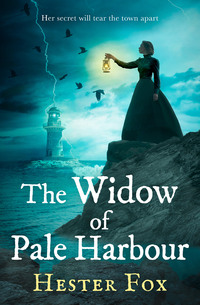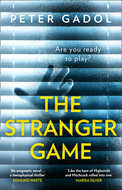Das Buch kann nicht als Datei heruntergeladen werden, kann aber in unserer App oder online auf der Website gelesen werden.
Buch lesen: "The Widow Of Pale Harbour"
A town gripped by fear. A woman cast out. Can he save Pale Harbor from itself?
Maine, 1846. Gabriel Stone is desperate to escape the ghosts that haunt him in Massachusetts after his wife’s death, so he moves to Maine, taking a position as a minister in the remote village of Pale Harbor.
But not all is as it seems in the sleepy town. Strange, unsettling things have been happening, and the townspeople claim that only one person can be responsible: Sophronia Carver, a reclusive widow who lives with a spinster maid in the eerie Castle Carver. Sophronia must be a witch, and she almost certainly killed her husband.
As the incidents escalate, one thing becomes clear: they are the work of a twisted person inspired by the wildly popular stories of Mr. Edgar Allan Poe. And Gabriel must find answers, or Pale Harbor will suffer a fate worthy of Poe’s darkest tales.
HESTER FOX is a keen painter and has a master’s degree in historical archaeology, as well as a background in medieval studies and art history. Hester lives outside of Boston with her husband, cat and new baby.
The Widow of Pale Harbour is her second novel.
Also by Hester Fox
The Witch of Willow Hall
The Widow of Pale Harbour
Hester Fox

Copyright

An imprint of HarperCollins Publishers Ltd
1 London Bridge Street
London SE1 9GF
First published in Great Britain by HQ in 2019
Copyright © Tess Fedore 2019
Tess Fedore asserts the moral right to be identified as the author of this work.
A catalogue record for this book is available from the British Library.
This novel is entirely a work of fiction. The names, characters and incidents portrayed in it are the work of the author’s imagination. Any resemblance to actual persons, living or dead, events or localities is entirely coincidental.
All rights reserved under International and Pan-American Copyright Conventions. By payment of the required fees, you have been granted the non-exclusive, non-transferable right to access and read the text of this e-book on-screen. No part of this text may be reproduced, transmitted, downloaded, decompiled, reverse engineered, or stored in or introduced into any information storage and retrieval system, in any form or by any means, whether electronic or mechanical, now known or hereinafter invented, without the express written permission of HarperCollins.
Ebook Edition © September 2019 ISBN: 9781474083898
Note to Readers
This ebook contains the following accessibility features which, if supported by your device, can be accessed via your ereader/accessibility settings:
Change of font size and line height
Change of background and font colours
Change of font
Change justification
Text to speech
Everyone is enchanted by Hester Fox!
‘This debut recalls Georgette Heyer, with extra spookiness’
The Times
‘Creepy, tense, heartbreaking and beautifully, achingly romantic’
Cressida McLaughlin
‘Steeped in Gothic eeriness it’s spine-tingling and very atmospheric’
Nicola Cornick
‘Beautifully written, with an intriguing plot full of suspense and mystery, The Witch of Willow Hall will cast a spell over every reader’
Lisa Hall
‘A wonderful debut novel’
Linda Finlay
And readers have fallen under her spell too!
‘I could NOT put this thing down!’
‘Do yourself a huge favour and read this NOW!’
‘Historical fiction with a side of romance and major helping of creepiness, this debut novel hits the mark!’
‘Hester Fox has the unique and amazing ability to transport readers to another time and place’
‘The perfect autumn read’
‘The ULTIMATE page turner!’
To Mike
Contents
Cover
Back Cover Text
About the Author
Booklist
Title Page
Copyright
Note to Readers
Praise
Dedication
Verse
Chapter 1
Chapter 2
Chapter 3
Chapter 4
Chapter 5
Chapter 6
Chapter 7
Chapter 8
Chapter 9
Chapter 10
Chapter 11
Chapter 12
Chapter 13
Chapter 14
Chapter 15
Chapter 16
Chapter 17
Chapter 18
Chapter 19
Chapter 20
Chapter 21
Chapter 22
Chapter 23
Chapter 24
Chapter 25
Chapter 26
Chapter 27
Chapter 28
Chapter 29
Chapter 30
Chapter 31
Chapter 32
Chapter 33
Chapter 34
Chapter 35
AUTHOR NOTE
ACKNOWLEDGMENTS
Extract
About the Publisher
“And this was the reason that, long ago,
In this kingdom by the sea,
A wind blew out of a cloud, chilling
My beautiful Annabel Lee;
So that her highborn kinsmen came
And bore her away from me,
To shut her up in a sepulchre
In this kingdom by the sea.”
—Edgar Allan Poe, “Annabel Lee”
1
This was the fourth dead raven to appear on Sophronia Carver’s front path in as many weeks, and there was no explaining it away as coincidence this time.
Except that this one wasn’t dead, not quite.
Sophronia had never killed a living creature before, but as she stared down at the raven and its crooked, twitching wings on her front path, she got the queasy feeling that the most humane course of action might be to snap the poor thing’s neck.
Tugging her shawl tighter against the chill, salty air, she crouched down to peer at the bird. Its feathers were blue and black—darker even than her own inky hair—and as iridescent as the ocean on a moonless night. The bird stared back at her, unmoving except for the slow blink of its glassy eye. She wanted very much to reach out a finger and stroke its slick feathers, but that somehow felt like a breach of confidence, like telling a secret that did not belong to her.
“Helen?” she called, without tearing her gaze away from the bird. “Helen, come quickly.”
Slowly rising to her feet, she gazed about the estate grounds and craned her neck to squint at the roof of the great old house, silhouetted against the heavy clouds. Perhaps the bird had fallen from the eaves. Or perhaps Duchess had felled it, though the old cat could barely bring down a mouse. That at least would explain how it had come to be lain so carefully across the center of the front path, as if it were some sort of pagan offering.
When Sophronia had come across the first dead raven, she had assumed it had been the victim of some sort of sickness, or perhaps weakened by storm winds. The next two she had likewise justified, but with a growing sense of uneasiness.
A prickle of cold blossomed down her spine as she realized that she could no longer dismiss the dead and injured birds. Someone—or something—was leaving them for her to find.
She stiffened, with a darting glance about her, as if someone might be lurking just beyond the broad lawn or out past the gate, watching her. But there was no one—the only movement the breeze through the flaming autumn trees, the only sound the faraway cry of a gull.
The path was supposed to be Safe. The entire grounds of the estate were supposed to be Safe. It was only out past the wrought-iron gate and into the town beyond that chaos and uncertainty reigned. Better to stay inside the grounds, where she had control. Sophronia had long ago learned to push all the bad memories and specters out of the house and into the world beyond, firmly shutting her heart and mind against them. So to see a creature in distress, so close to death—well, that was not Safe.
“Helen?” Sophronia called, louder this time, her voice carrying up the path to where the front door stood open. A moment later, a pale woman of about forty, her dark hair pulled severely back from her face, appeared in the doorway. She frowned at the sight of her mistress standing over the bird.
“Duchess must have caught it,” Sophronia said with a shake of her head as the woman stepped briskly over to where she was standing.
Helen gave her a skeptical look, and then leaned down to examine the bird for herself. “Duchess couldn’t catch her own tail,” she said, scorn edging her husky voice. “It’s the town brats making trouble again, I’d wager.”
Sophronia pressed her lips together tightly. They’d certainly had their share of children from the town coming up to the house, peeking through the windows and knocking at the door, all so that they could earn the distinction among their friends for glimpsing the infamous widow.
Suddenly, it was too unbearable to look at the exposed and broken bird a moment longer. Sophronia might have called for Garrett, the groundskeeper, but he was out on the far end of the property, cutting back the grass. Helen was capable and strong, though, and had a way with animals. “You’ll try to save it, won’t you? And if you can’t, you’ll make it...” Her words trailed off, but her meaning was unmistakable. Quick.
Carefully, Helen positioned her hands under the motionless bird, holding it slightly away from her as she lifted it. She ran a practiced hand along its wings, her dark brows furrowing in a mixture of concern and anger, as if the cruelty of humankind never ceased to surprise her. “Wings are both broken. And there’s something wrong with its foot.” But then she caught Sophronia’s anxious look and softened. “I’ll see what I can do, Sophy.”
Sophronia gave her a warm smile and watched Helen whisk the raven off to the carriage house, her movements brisk and efficient, her posture as neat as a pin. She had taken Helen on as a servant and companion during her early days as a lonely young bride, but over the years, the older woman had proved herself to be a true friend in every sense. Now it was just the two of them against the world, as Helen was so often wont to remind her.
The first raindrops were starting to fall when Sophronia finally allowed herself to stop thinking of the crooked bird and what it might mean and return indoors. Before the thump of the raven landing on the path had startled her from her reverie, Sophronia had been watching the storm roll in upstairs. Her late husband had always pompously referred to the large room lined with bay windows as the “upper piazza,” taking the big old house’s name, Castle Carver, to heart. Sophronia liked to watch storms approach from there; it was a sort of entertainment, drawing back the curtains like those in a theater, the harbor and endless gray sky a stage on which the rowdy gulls acted their plays.
She wandered through the house, unsettled. There were submissions to her late husband’s magazine piling up, submissions for which she was now responsible. Usually she enjoyed curling up in the parlor, tucked under a warm quilt with a cup of tea as she read through the stories and essays, curating which ones she would send along to the board for publication. But the raven had rattled her, and Sophronia was too anxious to read.
Instead, she continued back upstairs and threw the windows open. The rain was picking up now, the clouds building into something even heavier and more expectant. There was no moment so promising, so exciting, as the moment before a storm broke. Living on the Maine harbor, with naught but a finger of land to separate her home from the gray Atlantic, she had the opportunity to witness many storms, all from the safety of her window. On clear days, she could see the old lighthouse jutting out on the rocky promontory outside of town, winking back at her from its empty windows, an ally in her solitude. In the other direction lay a lonesome expanse of trees, dark and wild. It was a deceptively beautiful landscape, the sheer scale of woods and ocean promising endless possibilities, but in reality, it only swallowed up the hopes and dreams of young brides. At least on stormy days, the mist softened the harsh realities of the world, cloaked its darkness.
But today’s storm was different; she could feel it reverberating in her bones. Perhaps the raven had been a harbinger of things to come, an omen. Or perhaps it was just as Helen said—children from the town playing their cruel tricks on her, just like they had for years since her husband had died so violently and suddenly.
Sophronia sighed, drumming her fingers against the windowsill. God, she was so weary of it all. Weary of the solitude, weary of the little town, its people and their narrow minds, weary of the shell she had become. Tonight, she and Helen would eat a small supper in silence—they had few words left to say that weren’t old and stale, used up over the years—and then they would sit in the parlor, play a game of cards, and perhaps Sophronia would read a book or philosophical pamphlet while Helen plucked away at the old pianoforte. Tomorrow the laundry girl, Fanny, would come, and hopefully bring some gossip or news with her. They would chat for a little, and then Fanny would leave, and stillness would settle back over the house. It would be the same as every other day, but monotony was the price of safety. If the grand old house was indeed a castle, then Sophronia was its ghost, forever trapped, restless and roaming the halls.
She leaned out to close the window, but paused, letting the wind sweep up around her in an invigorating embrace. The building energy of the storm electrified her bones and caused tears to prick her eyes. Yes, there was something different about this storm. Change was sweeping toward Pale Harbor, and God knew, she needed it.
2
If Gabriel Stone had known what was inside the dilapidated old church and what it would lead to, he might have turned around, climbed back on the boat and returned to Concord immediately. But the rain was coming down in unforgiving sheets, and after days of travel, the time for reservations had long since passed.
Wiping the rain from his eyes, he stepped back, craning his neck, and turned his face up into the stormy night, taking in the church that he had trekked halfway up the east coast to reach. It was made of unassuming white clapboard, and its steeple barely peeked above the thrashing trees, as if in humble deference to this wild terrain in which it was an outsider, a latecomer, just like him.
It had taken him two coaches, a rail and finally a ship to arrive in Pale Harbor, only to find that no one was awaiting him at the dock. When it had become obvious that it was too dark even to locate his new lodgings, Gabriel had decided to go to the only other place he knew of in the town: his new church. He had followed the sight of the steeple, slogging through muddy roads that weren’t much more than old cow paths, lit only with the occasional lamplight from a lonely cottage window. But when he’d finally arrived at the church, the doors were locked. He was a sopping wet, hungry, short-tempered outsider and damn it, churches were supposed to be a refuge. Putting his shoulder against the old wood door, Gabriel gave another push, and cursed when it would not budge.
The wind howled around him. He shrugged the collar of his coat up in vain, trying to keep the slicing rain from penetrating any farther down his back. He would get in, spend the night, and then, in the light of day, find his lodgings and hopefully the trunks that he had sent ahead.
A glint of shattered glass in the fleeting moonlight caught his eye. A broken window. Gabriel peeled off his sopping wet overcoat, balled it around his fist and punched out the rest of the glass. With all the grace of a wet cat, he shimmied himself through the opening.
The musty air hit him like the release of a breath held in for too long, and he landed awkwardly on his ankle. “Goddamn it,” he muttered, and then, remembering where he was, grumbled an apology. It was as cool as a mausoleum inside, the air untouched for who knew how many years. The only light came from the brief flashes of lightning, and the occasional gasp of moonlight through the racing clouds. His wet clothes clung to him, chilling him down to his bones. It was not an auspicious beginning to his new venture.
“Anyone here?”
His voice echoed off the empty pews and hollow nave. There was no reason anyone would be in the old church, but one never knew if a lost soul had seen the steeple and wandered inside, looking for shelter or religious succor.
Gabriel let his gaze wander over the dark, indistinct shapes of the crumbling interior. It was not a large church—he could have reached the altar in less than twenty paces—but the rows of pews gaping with expectation gave it a sense of restless hunger, repelling and beckoning him at the same time.
So, this was to be his, then. Good God, what business did he have leading a congregation? It had always been Anna’s dream to found a spiritual community, to bring to life the ideals and values about which she so voraciously read and that had surrounded them in Concord. But now she was gone, and the fulfillment of her dreams was left to him. Perhaps he could make her proud in death where he had so often failed in life, but he rather doubted it. He had not been the intellectual, the enlightened thinker that she had so wished of him. This whole plan was madness; he was counterfeiting a version of himself that had never existed, all in the hopes of redeeming himself in the eyes of a woman who was gone. It was pathetic. He was pathetic.
He shook out his hat and pushed the wet hair out of his eyes. Cobwebs hung from the exposed rafters and dust grimed the stained glass, thick and dark. Gabriel cursed again as he tripped over a loose floorboard, steadying himself on the back of a dusty pew. The idea that he could make this a welcoming space was nearly as daunting as the thought of leading a flock to transcendental enlightenment. “Damn,” he murmured again, before he could stop himself. If he was going to be an even half-convincing minister, he was going to have to curb his vulgar habit of cursing.
Discarding his dripping coat, Gabriel cast his eye around for something that would make a suitable bed for the night. An old splintered pew couldn’t be any worse than the coach he had shared with six other gentlemen on his journey, all of whom had apparently been ill-acquainted with the concept of soap. He was just about to lower himself down onto the sturdiest-looking pew when a sound rose above the howling wind outside. Gabriel froze.
Someone was trying to get in. The door at the far end of the aisle was rattling, thumping, as if someone were pushing on it, just as Gabriel had tried at first. Without thinking, he grabbed the first thing that might reasonably serve as a weapon—a tarnished and cobwebbed brass candlestick—and crept to the door, where the latch was jiggling violently. It might have been a decrepit old church, and he might have been there only for a matter of minutes, but it was his decrepit old church, and by God, he would defend it.
Gabriel reached the door, held his breath and waited. His heart was beating in his ears, his mouth suddenly as dry as cotton. He wasn’t scared—he’d long ago lost the capacity for that when he’d lost everything that he held dear—but he didn’t particularly relish any more excitement for the day either. All he wanted was to close his eyes and get as dry as possible.
Just as the door swung open, he raised the candlestick above his head and lunged at the dark shape silhouetted against the rainy night.
“Sweet Jesus, don’t hurt me!” The figure dropped to the ground in a huddling mound. “I—I’m the sexton,” the man said, his voice muffled and pathetic.
Cursing, Gabriel stopped his swing. The candlestick dropped from his grasp, clattering to the floor. Of course it was the sexton. Who else would be interested in this rotting old church?
“Gabriel Stone,” he said, offering his hand to help the man up. “The new minister.” The words tasted strange on his tongue, and he realized it was the first time he had said them out loud.
The man staggered to his feet, wide-eyed and dripping wet. He regarded Gabriel with lingering panic. He was slight, with stooping shoulders and, at about thirty, was only a couple of years younger than Gabriel.
He knew what the man saw: Gabriel was too tall, too broad, too much like a lumbering giant. People glanced cautiously at him out the side of their eyes, as if he were a criminal, a tough. His voice, low and raspy, didn’t help. He was used to the reaction, but it never eased the pang of annoyance—and self-consciousness—that he felt. “I’m not going to hurt you,” he bit off, unable to keep the irritation from his voice. Then he raised his hands, palms up, in a gesture of pacification.
The sexton gave a hesitant nod and swallowed, extending his hand. “Ezekiel Lewis, but folks just call me Lewis. That’s quite the grip you have,” he said, rubbing his hand and warily eyeing the discarded candlestick.
Gabriel had corresponded with someone before coming to Pale Harbor, but as with all things concerning this new venture, he had been unsure of his footing, of exactly what he was supposed to say. Now he wasn’t sure if it was Lewis he’d written to, or someone else in the town when he’d sent ahead notice that the minister who was supposed to come to Pale Harbor had died and that Gabriel was his replacement. That wasn’t strictly true, but it wasn’t a lie, either. When the brilliant Reverend Joshua Whipple of Concord had died in a carriage accident, Gabriel had seized on his chance to be the man that Anna would have wanted. It had all moved so quickly after he’d set the plan in motion, and then there had been no going back.
Gabriel regarded the nervous man and decided to take a gamble.
“I believe you were expecting me?”
Lewis nodded. “I was meant to meet you at the dock, but my cart got stuck in the mud and delayed me. When I couldn’t find you, I figured you might have come up to the church. I don’t suppose you’ll be wanting me to take you to the cottage now, after all?”
The poor man might have been even more soaked than himself, and he had only a threadbare coat to protect him from the elements. “Might as well bide here for a while yet. No use in going back out into the storm,” Gabriel said.
Lewis nodded his agreement, looking grateful. He had closed the door behind him and was rubbing his arms to get warm. “It’s a wonder the ship was even able to make dock in this weather,” he said, after a particularly harsh clap of thunder.
It had been a bumpy ride, the dark water endlessly churning like a witch’s cauldron, and Gabriel had watched more than one of his fellow passengers be sick over the rail. The two men lapsed into silence, the pounding storm outside making the church feel somehow smaller, more intimate. Gabriel, though never one for small talk, somehow found himself falling into conversation easily in the dark.
“Have you been the sexton long?” Lewis was decades younger than Gabriel would have thought someone in his position would be, and it was hardly a trade for an ambitious young man.
“No, sir. That is, there isn’t much need for a sexton these days,” Lewis said, jutting his chin vaguely into the shadowy church. “I work at the cemetery, digging graves and groundskeeping and the like. I come around here a couple of times a month to cut the grass and make sure no one has broken in.” His look grew sheepish. “Might have been a few months since I last came inside.”
Gabriel had begun to move away from the door and farther into the church, inspecting his new domain as much as he could in the near blackness.
Lewis followed him, swallowing. “I’d wanted it cleaned up before you saw it...” he said, trailing off, as he dashed a cobweb away from his face.
“I’ll see to all the cleaning later.” Gabriel squinted into the darkness. The last of the moon had long since slid behind a heavy bank of clouds. “You don’t have a match, by chance?”
Lewis fumbled in his pocket, miraculously producing a dry matchbox, and struck a match. He touched it to a piece of wood, throwing light onto the empty pews and casting grotesque shadows from the forgotten saints.
The cross at the altar would have to go, and Mary stared at him with accusing eyes, as if she knew that her tenure would be short-lived. The stained glass might stay, but everything else was the vestige of an outdated religion and had no place in a home for transcendentalism. Or so he assumed, though he wasn’t quite sure. Anna would have known; she had been so smart, so clever. Unitarianism—with its strict interpretation of monotheism and all things scientific and rational—might have taken root in Boston, but it was transcendentalism, with its wild abandon to the spiritual, that had so enamored her in Concord. Stop thinking about her, he chided himself. Do this for her, but for God’s sake don’t wallow in self-pity.
A flash of movement snapped Gabriel from his thoughts. “What was that?” He put his hand out to stop Lewis.
Lewis swung the light back around toward the altar and took a sharp breath. Something was moving, rustling about in the debris under the cross.
Without thinking, Gabriel began making his way up the aisle, pushing aside detritus. There was something at the altar, a shape blacker than the rest of its dark surroundings. And it was moving.
His skin prickled and despite his cold, wet clothes, sweat beaded along Gabriel’s neck. The walls danced with quivering shadows, the wind howling and gripping the creaking church tighter. He swallowed. It was not a particularly welcoming place, but now a sense of wrongness took hold of him, as if he were not supposed to be here. As if something did not want him here.
A crash and fluttering broke the stillness. Lewis fell to his knees, and Gabriel flinched as something disturbed the air over their heads.
“What the—”
Taking the torch from Lewis, Gabriel held it up, dimly illuminating the rafters. From the darkness above, a pair of gleaming black eyes blinked down at him.
“It’s a bird,” he said, feeling foolish that his heart was still racing, his palms sweating. Lewis, who had lost about three shades from his already pale face, let out a shaky breath. “There are holes in the roof. It must have come through one to get out of the storm.”
The bird—a raven or a crow, something big and black—cocked its head and blinked down at them with vague interest. Then it shuffled its wings a few times and settled down to roost.
Suddenly, Gabriel just wanted to sleep, even if his new lodgings were cold and empty. He’d had enough of the dank church and its accusing shadows. He was just about to broach the idea of plunging out into the storm when he caught a hint of a strange odor.
The whole church had a musty, unused smell about it, but this was different. Pungent, sweet. Acrid to the point of making his eyes water, and only growing stronger. Curiosity overcame apprehension, and he drew closer to the altar.
He jerked backward. “Oh, God.” Gabriel buried his nose in his handkerchief, fighting the rising gag in his throat. Beside him, Lewis made the sign of the cross over his chest.
This must have been what had attracted the carrion bird, why it had been pecking about the altar. It was a wonder he hadn’t smelled it right away. Bones and fur lay before them, strips of rancid flesh. It was such a mess that it was impossible to tell what the animal might have been in life, or even if it had been a single animal.
“What the hell is that doing here?”
Maybe some forest creature had found its way into the church and then perished after it was unable to get out. But something about its position on the altar sent a chill down Gabriel’s spine. Why wasn’t it nearer a door, or window, if it had died trying to get out of the church? How had it come to lie on the most conspicuous feature of the building?
Lewis shifted uncomfortably. “I can’t say I’ve seen anything particularly like this, but—”
Just then a loud crack of thunder rang out, swallowing his words. Lewis jumped back and the light stuttered out, leaving them in darkness.
Gabriel had had enough. The church was in ruins and clearly would need to be addressed in the light of day. The animal remains weren’t going anywhere, and there wasn’t anything they could do about them in the middle of the night anyway.
“All right. Let’s leave it for now.”
A hiss of relief came from the darkness behind him. “Very good, Reverend.”
They gingerly made their way back to the door, and Gabriel shoved his wet hat back on his head. A pang of melancholy ran through him at the thought of arriving at an empty house. He was running away from a painfully empty home in Concord; had he really done all this only to exchange it for another, and in an unfamiliar place, no less?
Between the unsettling discovery at the altar and the icy impassiveness of the church, what little luster his plans had had now faded to a dull and miserable gray. Gabriel was cold, weary and utterly alone. And it was only a matter of time before the town of Pale Harbor discovered him for the fraud he was.








